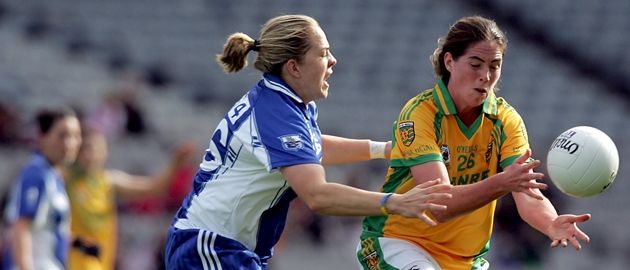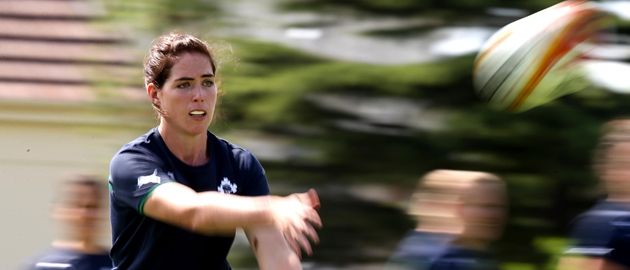
Rugby

Share
23rd January 2015
05:56pm GMT

 An issue with a swelling nerve in her back eventually ended Stapleton's hectic, dual-star life. Rugby is now her playing and wage-earning career. The out-half works as a Women and Girls' Rugby Development Executive in the IRFU. Her focus, and brief, is encouraging as many young girls to take up the game and to ensure proper structures exist for those that take up the game, all the way to adult level. Arriving into her new role [she got the job in February 2013 but took it up a month later] as a Grand Slam winner was a perfect start.
She recalls, 'After the French game, we were talking about the [Six Nations] trophy and presuming we'd get one to tour. We did, and it was a new experience for everyone involved. We toured the trophy about 14,000 miles around Ireland but, if we were ever to win it again, I would double that. At least.
'One day, I remember driving out to Ballina and arriving in time for their Under-10 and U12 girls' training. For a young girl to get a picture with the trophy or one of the players she has watched on TV - or on a live stream - is so important. It will hopefully give them something to aim for and another reason to stay in the game.'
An issue with a swelling nerve in her back eventually ended Stapleton's hectic, dual-star life. Rugby is now her playing and wage-earning career. The out-half works as a Women and Girls' Rugby Development Executive in the IRFU. Her focus, and brief, is encouraging as many young girls to take up the game and to ensure proper structures exist for those that take up the game, all the way to adult level. Arriving into her new role [she got the job in February 2013 but took it up a month later] as a Grand Slam winner was a perfect start.
She recalls, 'After the French game, we were talking about the [Six Nations] trophy and presuming we'd get one to tour. We did, and it was a new experience for everyone involved. We toured the trophy about 14,000 miles around Ireland but, if we were ever to win it again, I would double that. At least.
'One day, I remember driving out to Ballina and arriving in time for their Under-10 and U12 girls' training. For a young girl to get a picture with the trophy or one of the players she has watched on TV - or on a live stream - is so important. It will hopefully give them something to aim for and another reason to stay in the game.'
 Stapleton brought the Six Nations trophy home to Fahan, Donegal, and her secondary school [Crana College] in Buncrana. 'It was great for me to present the trophy to the students and teachers there. I got so much encouragement from everyone at the school. They introduced me to that love of sport. I hope I can have that same effect on some of the girls there.'
Former Ireland captain Fiona Coghlan, who was one of six senior players to retire following last summer's World Cup, suggests the women's team need a greater club competition and to play at least one Test match a year in a Dublin venue such as the RDS or Tallaght Stadium. Stapleton, while stressing the squad's fondness for Ashbourne, agrees. 'Having one game up in Tallaght or at the RDS would get more supporters in the door as it is easier to get along and see you,' she says.
As for tying down more competitive matches for the Irish provinces, Stapleton reveals that an early template of a Women's European Cup may not be too far off. She says, 'We were hoping to stage an event, where the winners of the Irish, English and Welsh cup competitions would face each other in a mini tournament. It didn't work out with Wales and a winners' match between the Irish and English sides will not happen this year, but hopefully in 2016.'
Stapleton adds, 'For years, we assumed that England were a lot better than us. We started going close in the Six Nations and beat them in the Grand Slam year. We proved we could compete. By allowing our clubs [provinces] to take on the best sides from other countries, starting with England, we can hopefully show that there is not a huge gap.'
Stapleton brought the Six Nations trophy home to Fahan, Donegal, and her secondary school [Crana College] in Buncrana. 'It was great for me to present the trophy to the students and teachers there. I got so much encouragement from everyone at the school. They introduced me to that love of sport. I hope I can have that same effect on some of the girls there.'
Former Ireland captain Fiona Coghlan, who was one of six senior players to retire following last summer's World Cup, suggests the women's team need a greater club competition and to play at least one Test match a year in a Dublin venue such as the RDS or Tallaght Stadium. Stapleton, while stressing the squad's fondness for Ashbourne, agrees. 'Having one game up in Tallaght or at the RDS would get more supporters in the door as it is easier to get along and see you,' she says.
As for tying down more competitive matches for the Irish provinces, Stapleton reveals that an early template of a Women's European Cup may not be too far off. She says, 'We were hoping to stage an event, where the winners of the Irish, English and Welsh cup competitions would face each other in a mini tournament. It didn't work out with Wales and a winners' match between the Irish and English sides will not happen this year, but hopefully in 2016.'
Stapleton adds, 'For years, we assumed that England were a lot better than us. We started going close in the Six Nations and beat them in the Grand Slam year. We proved we could compete. By allowing our clubs [provinces] to take on the best sides from other countries, starting with England, we can hopefully show that there is not a huge gap.'Explore more on these topics: